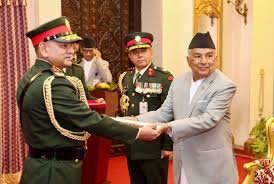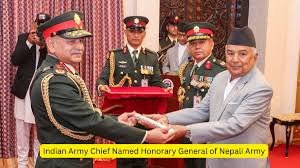Indian Army Chief Named Honorary General of Nepali Army
Introduction: Indian Army Chief’s Prestigious Honor
In a significant development in military diplomacy, the Indian Army Chief, General Manoj Pande, has been conferred the title of “Honorary General of the Nepali Army.” This prestigious honor was presented to him by the President of Nepal, Bidya Devi Bhandari, during a special ceremony at the Nepali Army Headquarters in Kathmandu. The gesture marks a strengthening of the historical ties between the Indian and Nepali armed forces.
Historical Significance of the Honor
The tradition of conferring honorary military titles between India and Nepal has a long history, symbolizing the strong and enduring bond between the two nations. The Indian Army Chief is usually named as the Honorary General of the Nepali Army, and similarly, the Chief of the Nepali Army is made the Honorary General of the Indian Army. This exchange of titles is a reflection of the close military cooperation, cultural exchange, and diplomatic relations between the two countries.
Strengthening Bilateral Relations through Military Diplomacy
This honor comes at a time when India and Nepal are working closely on a variety of issues, including defense cooperation, security, and trade. Both countries share a long border, and their armed forces engage in frequent joint training exercises, including humanitarian and disaster relief operations. The conferring of this title underscores the importance of maintaining close military and diplomatic ties to ensure regional stability and mutual security.
Impact on Defense Cooperation
The relationship between the Indian Army and the Nepali Army has always been a cornerstone of bilateral defense cooperation. Over the years, both armies have participated in numerous joint military exercises, and this honorary title further solidifies the strong defense partnership. It also opens the door for future collaborations in training, defense technology exchange, and joint military operations, contributing to the overall stability of the region.

Why This News is Important: Strengthening Regional Relations
Enhancing Diplomatic Ties between India and Nepal
This news is important as it highlights the continuing strong relationship between India and Nepal, particularly in the defense sector. The conferment of the honorary title fosters deeper diplomatic and military relations, ensuring that both nations continue to cooperate on critical security matters. The symbolic gesture reinforces mutual respect, trust, and strategic partnerships in the region.
Impact on Bilateral Defense Cooperation
The appointment of the Indian Army Chief as the Honorary General of the Nepali Army signals a deepening defense cooperation between the two nations. This enhances their ability to address regional security concerns, such as terrorism, natural disasters, and border security. A closer defense partnership allows both countries to exchange expertise, conduct joint training, and share military resources, contributing to regional peace and stability.
Cultural and Military Ties Between India and Nepal
This ceremonial tradition not only reflects strong military cooperation but also reinforces the cultural bonds between the two nations. India and Nepal share deep historical ties, and their military camaraderie is an essential aspect of their broader cultural and strategic alliance. The conferment of honorary titles is a reminder of this longstanding tradition that transcends geopolitical challenges and fosters mutual understanding.
Historical Context: A Tradition of Honorary Military Titles
The exchange of honorary military titles between India and Nepal dates back to the 1950s, and it has been a key element in solidifying bilateral ties. This tradition is rooted in the close military and cultural relations that both countries have maintained over the years. Historically, the Indian Army has played an essential role in assisting Nepal’s military during critical moments, such as during natural disasters or in counter-insurgency operations.
The Chief of the Nepali Army holds the honorary title of General of the Indian Army, and vice versa, a tradition that has been preserved despite changes in leadership on both sides. This military-to-military cooperation has been pivotal in managing border issues, joint military training, and enhancing both nations’ defense capabilities. The title is a symbol of mutual respect and commitment to shared security goals.
Key Takeaways from “Indian Army Chief Named Honorary General of Nepali Army”
| Serial Number | Key Takeaway |
|---|---|
| 1 | General Manoj Pande, the Indian Army Chief, has been conferred the title of Honorary General of the Nepali Army. |
| 2 | The honorary title reflects the deep military ties and historical cooperation between India and Nepal. |
| 3 | This exchange of honorary titles strengthens diplomatic and defense relations between India and Nepal, enhancing regional security. |
| 4 | The tradition of conferring honorary military titles between India and Nepal has been in place for decades, symbolizing enduring bilateral ties. |
| 5 | The honor further opens opportunities for joint military exercises, defense cooperation, and security collaborations between the two nations. |
Important FAQs for Students from this News
Who is General Manoj Pande?
General Manoj Pande is the Chief of the Indian Army. He was recently named the Honorary General of the Nepali Army in recognition of his leadership and the long-standing military ties between India and Nepal.
What is the significance of the title “Honorary General” of the Nepali Army?
The honorary title is a gesture of respect and signifies the strong military relations between India and Nepal. This tradition has been in place for decades and reflects the close defense cooperation between both nations.
Why is the exchange of honorary military titles important for India and Nepal?
The exchange of honorary military titles fosters better diplomatic ties, enhances defense cooperation, and signifies mutual respect. It also strengthens military-to-military relations, which is critical for regional security.
What other defense collaborations do India and Nepal have?
India and Nepal engage in joint military exercises, share intelligence, collaborate in counter-insurgency operations, and work together in humanitarian efforts, particularly during natural disasters.
What is the historical context behind India and Nepal’s military cooperation?
The military relationship between India and Nepal dates back to the 1950s. The exchange of honorary titles is a reflection of this long history of collaboration in defense, security, and cultural ties.
Some Important Current Affairs Links


















